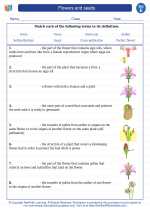Flowers and seeds -> physiology
Physiology: Exploring the Science of Life
Physiology is the branch of biology that focuses on the study of how living organisms function. It encompasses the study of various processes and mechanisms that occur within the body, including those at the cellular, tissue, organ, and organismal levels. Understanding physiology is essential for comprehending how the human body works and how it responds to different internal and external stimuli.
Key Concepts in Physiology
- Homeostasis: This refers to the body's ability to maintain stable internal conditions despite external changes. It involves processes such as temperature regulation, pH balance, and blood sugar control.
- Cellular Respiration: The process by which cells convert nutrients into energy, typically through the consumption of oxygen and the production of carbon dioxide.
- Neuroscience: The study of the nervous system, including how nerve cells transmit signals and how the brain interprets and processes information.
- Muscle Contraction: The mechanism by which muscles generate force and movement, involving interactions between muscle fibers, nerve signals, and energy production.
- Circulatory System: The system responsible for transporting blood, oxygen, nutrients, and waste products throughout the body, facilitated by the heart, blood vessels, and blood itself.
Studying Physiology: Essential Topics
When diving into the study of physiology, it's important to grasp fundamental concepts that form the basis of our understanding of living organisms. Here are some key topics to focus on:
- Cell Biology: Understanding the structure and function of cells, including organelles, cellular processes, and cell communication.
- Respiratory System: Exploring how the lungs and respiratory tract work to facilitate gas exchange and the transport of oxygen and carbon dioxide.
- Endocrine System: Delving into the role of hormones and the glands that produce them in regulating bodily functions and maintaining homeostasis.
- Digestive System: Examining the process of digestion, absorption of nutrients, and the functions of various digestive organs.
- Renal Physiology: Understanding the function of the kidneys in filtering blood, regulating water and electrolyte balance, and excreting waste products.
Exploring Applied Physiology
Physiology extends beyond theoretical knowledge and has numerous real-world applications in fields such as medicine, sports science, and nutrition. Here are some areas where an understanding of physiology is crucial:
- Medical Diagnostics: How physiological measurements and tests are used to assess and diagnose health conditions.
- Exercise Science: Understanding how the body responds to physical activity and the principles of training and conditioning.
- Nutritional Physiology: Examining how nutrients are utilized by the body and the physiological consequences of dietary choices.
- Pharmacology: Understanding how drugs and medications affect physiological processes and how they are used to treat diseases.
Study Tips for Physiology
When delving into the intricate world of physiology, it's important to approach the subject with curiosity and a willingness to engage in active learning. Here are some tips to enhance your study experience:
- Visualize Concepts: Use diagrams, models, and animations to visualize physiological processes and structures.
- Relate to Everyday Life: Connect physiological concepts to everyday experiences to make the material more relatable and memorable.
- Practice Application: Engage in practical exercises, such as case studies and problem-solving scenarios, to apply physiological principles to real-world situations.
- Collaborate and Discuss: Form study groups or engage in discussions with peers to exchange ideas and deepen your understanding of complex physiological concepts.
By immersing yourself in the multifaceted world of physiology, you'll gain a profound appreciation for the intricate mechanisms that sustain life and contribute to the diverse functions of living organisms.
[Physiology] Related Worksheets and Study Guides:
.◂Science Worksheets and Study Guides Fifth Grade. Flowers and seeds
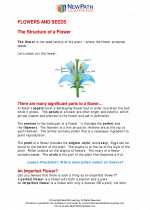
 Activity Lesson
Activity Lesson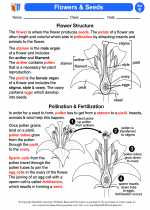
 Worksheet/Answer key
Worksheet/Answer key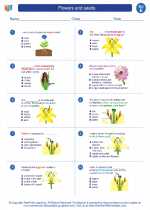
 Worksheet/Answer key
Worksheet/Answer key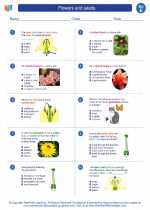
 Worksheet/Answer key
Worksheet/Answer key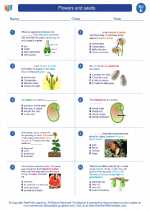
 Worksheet/Answer key
Worksheet/Answer key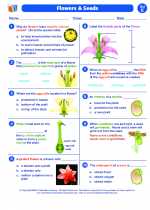
 Vocabulary/Answer key
Vocabulary/Answer key
 Vocabulary/Answer key
Vocabulary/Answer key